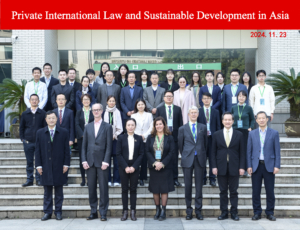Views
China’s Draft Law on Foreign State Immunity—Part II
Written by Bill Dodge, the John D. Ayer Chair in Business Law and Martin Luther King Jr. Professor of Law at UC Davis School of Law.
In December 2022, Chinese lawmakers published a draft law on foreign state immunity, an English translation of which is now available. In a prior post, I looked at the draft law’s provisions on immunity from suit. I explained that the law would adopt the restrictive theory of foreign state immunity, bringing China’s position into alignment with most other countries.
In this post, I examine other important provisions of the draft law, including immunity from attachment and execution, service of process, default judgments, and foreign official immunity. These provisions generally follow the U.N. Convention on Jurisdictional Immunities of States and Their Property, which China signed in 2005 but has not yet ratified.
China’s draft provisions on immunity from attachment and execution, service of process, and default judgments make sense. Applying the draft law to foreign officials, however, may have the effect of limiting the immunity that such officials would otherwise enjoy under customary international law. This is probably not what China intends, and lawmakers may wish to revisit those provisions before the law is finally adopted. Read more
What is a Judgment (in the context of Reg 655/2014)? – CJEU Case C-291/21 Starkinvest
Less than half a year after the CJEU’s decision in Case C-646/20 Senatsverwaltung für Inneres (discussed here by Krzysztof Pacula), the Court had to engage again with the question of what constitutes a “judgment” in the sense of an EU instrument in Case C-291/21 Starkinvest.
This time, the question arose in the context of Regulation 655/2014 establishing a European Account Preservation Order procedure to facilitate cross-border debt recovery in civil and commercial matters. The regulation envisages two kinds of situation:
- The creditor has already obtained a “judgment” (Art. 7(1)): In this case, the creditor only needs to show that there is an urgent need for a protective measure to ensure that the judgment can be effectively enforced against the debtor.
- The creditor has not yet obtained a “judgment” (Art. 7(2)): In this case, the creditor also needs to show “that he is likely to succeed on the substance of his claim against the debtor”.
In Starkinvest, the claimant had obtained a decision from the Tribunal de commerce de Liège, Belgium, that ordered the debtor to cease seeling certain goods, subject to a penalty payment of EUR 2 500 per breach. On the basis of that decision, they later sought payment of EUR 85 000 in penalties, which they requested the referring court to secure through a European Account Preservation Order. Confronted with the question of how to characterise the initial decision in the context of the above dichotomie, the court referred the case to the CJEU.
International commercial courts for Germany?
This post is also available via the EAPIL blog.
On 25 April 2023 the German Federal Ministry of Justice (Bundesministerium der Justiz – BMJ) has published a bill relating to the establishment of (international) commercial courts in Germany. It sets out to strengthen the German civil justice system for (international) commercial disputes and aims to offer parties an attractive package for the conduct of civil proceedings in Germany. At the same time, it is the aim of the bill to improve Germany’s position vis-à-vis recognized litigation and arbitration venues – notably London, Amsterdam, Paris and Singapore. Does this mean that foreign courts and international commercial arbitration tribunals will soon face serious competition from German courts?
English-language proceedings in all instances
Proposals to improve the settlement of international commercial disputes before German courts have been discussed for many years. In 2010, 2014, 2018 and 2021, the upper house of the German Federal Parliament (Bundesrat) introduced bills to strengthen German courts in (international) commercial disputes. However, while these bills met with little interest and were not even discussed in the lower house of Parliament (Bundestag) things look much brighter this time: The coalition agreement of the current Federal Government, in office since 2021, promises to introduce English-speaking special chambers for international commercial disputes. The now published bill of the Federal Ministry of Justice can, therefore, be seen as a first step towards realizing this promise. It heavily builds on the various draft laws of the Bundesrat including a slightly expanded version that was submitted to the Bundestag in 2022.
The bill allows the federal states (Bundesländer) to establish special commercial chambers at selected regional courts (Landgerichte) which shall, if the parties so wish, conduct the proceedings comprehensively in English. Appeals and complaints against decisions of these chambers shall be heard in English before English-language senates at the higher regional courts (Oberlandesgerichte). If the value in dispute exceeds a threshold value of 1 million Euros and if the parties so wish, these special senates may also hear cases in first instance. Finally, the Federal Supreme Court (Bundesgerichtshof) shall be allowed to conduct proceedings in English. Should the bill be adopted – which seems more likely than not in light of the coalition agreement – it will, thus, be possible to conduct English-language proceedings in at least two, maybe even three instances. Compared to the status quo, which limits the use of English to the oral hearing (cf. Section 185(2) of the Court Constitution Act) and the presentation of English-language documents (cf. Section 142(3) of the Code of Civil Procedure) this will be a huge step forward. Nonetheless, it seems unlikely that adoption of the bill will make Germany a much more popular forum for the settlement of international commercial disputes.
Remaining disadvantages vis-à-vis international commercial arbitration
To begin with, the bill – like previous draft laws – is still heavily focused on English as the language of the court. Admittedly, the bill – following the draft law of the Bundesrat of March 2022 – also proposes changes that go beyond the language of the proceedings. For example, the parties are to be given the opportunity to request a verbatim record of the oral proceedings. In addition, business secrets are to be better protected. However, these proposals cannot outweigh the numerous disadvantages of German courts vis-à-vis arbitration. For example, unlike in arbitration, the parties have no influence on the personal composition of the court. As a consequence, they have to live with the fact that their – international – legal dispute is decided exclusively by German (national) judges, who rarely have the degree of specialization that parties find before international arbitration courts. In addition, the digital communication and technical equipment of German courts is far behind what has been standard in arbitration for many years. And finally, one must not forget that there is no uniform legal framework for state judgments that would ensure their uncomplicated worldwide recognition and enforcement.
Weak reputation of German substantive law
However, the bill will also fail to be a resounding success because it ignores the fact that the attractiveness of German courts largely depends on the attractiveness of German law. To be sure, German courts may also apply foreign law. However, their real expertise – and thus their real competitive advantage especially vis-à-vis foreign courts – lies in the application of German law, which, however, enjoys only a moderate reputation in (international) practice. Among the disadvantages repeatedly cited by practitioners are, on the one hand, the numerous general clauses (e.g. §§ 138, 242 of the German Civil Code), which give the courts a great deal of room for interpretation, and, on the other hand, the strict control of general terms and conditions in B2B transactions. In addition – and irrespective of the quality of its content – German law is also not particularly accessible to foreigners. Laws, decisions and literature are only occasionally available in English (or in official English translation).
Disappointing numbers in Amsterdam, Paris and Singapore
Finally, it is also a look at other countries that have set up international commercial courts in recent years that shows that the adoption of the bill will not make German courts a blockbuster. Although some of these courts are procedurally much closer to international commercial arbitration or to the internationally leading London Commercial Court, their track record is – at least so far – rather disappointing.
This applies first and foremost to the Netherlands Commercial Court (NCC), which began its work in Amsterdam in 2019 and offers much more than German courts will after the adoption and implementation of the bill: full English proceedings both in first and second instance, special rules of procedure inspired by English law on the one hand and international commercial arbitration law on the other, a court building equipped with all technical amenities, and its own internet-based communication platform. The advertising drum has also been sufficiently beaten. And yet, the NCC has not been too popular so far: in fact, only 14 judgments have been rendered in the first four years of its existence (which is significantly less than the 50 to 100 annual cases expected when the court was set up).
The situation in Paris is similar. Here, a new chamber for international commercial matters (chambre commerciale internationale) was established at the Cour d’appel in 2018, which hears cases (at least in parts) in English and which applies procedural rules that are inspired by English law and international arbitration. To be sure, the latter cannot complain about a lack of incoming cases. In fact, more than 180 cases have been brought before the new chamber since 2018. However, the majority of these proceedings are due to the objective competence of the Chamber for international arbitration, which is independent of the intention of the parties. In contrast, it is not known in how many cases the Chamber was independently chosen by the parties. Insiders, however, assume that the numbers are “negligible” and do not exceed the single-digit range.
Finally, the Singapore International Commercial Court (SICC), which was set up in 2015 with similarly great effort and ambitions as the Netherlands Commercial Court, is equally little in demand. Since its establishment, it has been called upon only ten times by the parties themselves. In all other cases in which it has been involved, this has been at the instigation of the Singapore High Court, which can refer international cases to the SICC under certain conditions.
No leading role for German courts in the future
In the light of all this, there is little to suggest that the bill, which is rather cautious in its substance and focuses on the introduction of English as the language of proceedings, will lead to an explosion – or even only to a substantial increase – in international proceedings before German courts. While it will improve – even though only slightly – the framework conditions for the settlement of international disputes, expectations regarding the effect of the bill should not be too high.
Note: Together with Yip Man from Singapore Management University Giesela Rühl is the author of a comparative study on new specialized commercial courts and their role in cross-border litigation. Conducted under the auspices of the International Academy of Comparative Law (IACL) the study will be published with Intersentia in the course of 2023.
News
Call for papers: Australasian Association of Private International Law inaugural conference, Brisbane, Australia, 16-17 April 2025
The inaugural conference of the Australasian Association of Private International Law will be held from Wednesday 16 to Thursday 17 April at the Ship Inn conference centre, Southbank, Brisbane, Queensland, Australia, sponsored by Griffith Law School.
We are pleased to invite the submission of paper proposals for the conference, on any aspect of private international law, broadly understood. This includes issues of jurisdiction, choice of law, the recognition and enforcement of foreign judgments (including how they relate to cross-border issues within a federation), and all areas of private law that raise cross-border and transnational issues.
Paper proposals should be made on this form by Wednesday 29 January 2025. We also welcome panel proposals; please email aapril2025conference@gmail.com if you have a proposal for a panel. Proposed presenters on any panel will be required to submit paper proposals.
We welcome anyone interested in private international law, including from the judiciary, legal practice, government, and the academy, from any jurisdiction. Attendees, including presenters, will be required to pay a registration fee. A conference dinner will be held on the evening of Wednesday 16 April, at an additional cost.
Report on the launch event of the Australasian Association of Private International Law
On Thursday 5 December 2024, a group of private international lawyers gathered in Melbourne and online for the launch of the Australasian Association of Private International Law (AAPrIL).
AAPrIL was founded in 2024 by lawyers and academics in Australia and New Zealand who are engaged in private international law. AAPrIL’s aim is to bring together people committed to furthering understanding of private international law in Australia, New Zealand and the Pacific region.
The launch was held at the offices of Corrs Chambers Westgarth in Melbourne. After networking and drinks, the formalities were opened by Cara North, Corrs Special Counsel and AAPrIL Treasurer, who would be known to many following the blog for her work on the HCCH Judgments Project. Cara introduced Jack Wass, New Zealand barrister and AAPRIL’s New Zealand Vice-President, who is co-author of The Conflict of Laws in New Zealand and who was Master of Ceremonies.
The event featured addresses from two of the most influential lawyers in private international law issues from either side of the Tasman Sea.
The Honourable Dr Andrew Bell, Chief Justice of New South Wales, gave a comprehensive pre-recorded address, speaking to the importance of the discipline and the growing number of judgments dealing with cross-border issues in Australia. His Honour has been deeply engaged in private international law for decades; he his author of Forum Shopping and Venue in Transnational Litigation and a co-author of Nygh’s Conflict of Laws in Australia, and acted as counsel in many of Australia’s most significant private international law cases until his appointment to the New South Wales Supreme Court. Chief Justice Bell is the inaugural Patron of AAPrIL.
The Honourable David Goddard, Judge of the Court of Appeal of New Zealand, then delivered a live online address that also spoke to the importance of the discipline. His Honour advocated for the continued modernisation of domestic laws to harmonise approaches to private international law problems between legal systems, encouraging governments to adopt instruments of the Hague Conference on Private International Law (HCCH). Justice Goddard is perfectly placed to speak to the subject: he was the Chair of the Diplomatic Session of the HCCH that adopted the 2019 HCCH Judgments Convention, Vice-President of the Diplomatic Session that adopted the 2005 Choice of Court Convention, and a member of the drafting committee for that Convention. Read more
Private International Law and Sustainable Development in Asia at Wuhan University – Report
By Zixuan Yang, a PhD student at Max Planck Institute for Comparative and International Private Law in Hamburg, Germany.
The Conference on Private International Law and Sustainable Development in Asia was successfully held at Wuhan University School of Law on 23rd November 2024. This international symposium was organized by Wuhan University Academy of International Law and Global Governance, Wuhan University School of Law and China Society of Private International Law. Following a Call for Papers of the Chinese Journal of Transnational Law (CJTL), the symposium provided an ideal platform for participants to critically and constructively engage with the functions, methodologies and techniques of private international law in relation to sustainable development from the Asian perspective. Distinguished legal experts and scholars from Japan, India, Vietnam, Singapore, Hong Kong SAR, Macao SAR, Taiwan, Mainland China, Germany and the Netherlands delivered presentations and participated in discussions on-site and online.

After Professor Zheng Tang opened the conference, vice President of the China Law Society, President of the China Society of International Law and President of the China Society of Private International Law, offered a welcome. This was followed by a joint keynote speech from Professor Ralf Michaels (Max Planck Institute for Comparative and International Private Law, Hamburg), Professor Verónica Ruiz Abou-Nigm (University of Edinburgh), and Hans van Loon (former Secretary-General of the Hague Conference on Private International Law) on Private International Law and SDGs 2030. Together with Zheng Tang, they will serve as special editors of an issue in CJTL that brings the papers together. Read more




